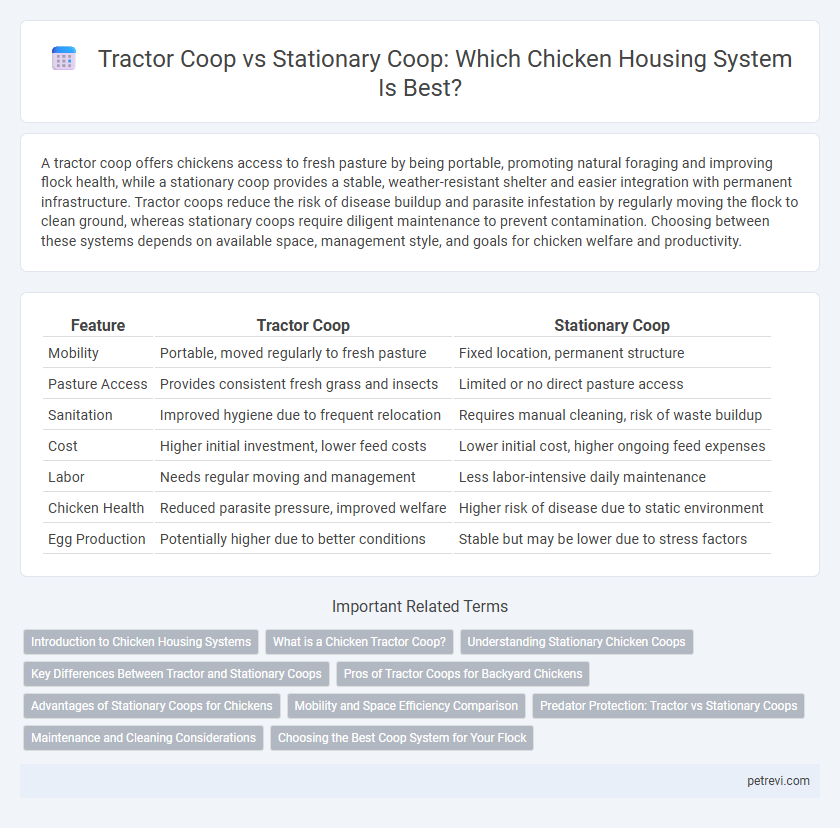A tractor coop offers chickens access to fresh pasture by being portable, promoting natural foraging and improving flock health, while a stationary coop provides a stable, weather-resistant shelter and easier integration with permanent infrastructure. Tractor coops reduce the risk of disease buildup and parasite infestation by regularly moving the flock to clean ground, whereas stationary coops require diligent maintenance to prevent contamination. Choosing between these systems depends on available space, management style, and goals for chicken welfare and productivity.
Table of Comparison
| Feature | Tractor Coop | Stationary Coop |
|---|---|---|
| Mobility | Portable, moved regularly to fresh pasture | Fixed location, permanent structure |
| Pasture Access | Provides consistent fresh grass and insects | Limited or no direct pasture access |
| Sanitation | Improved hygiene due to frequent relocation | Requires manual cleaning, risk of waste buildup |
| Cost | Higher initial investment, lower feed costs | Lower initial cost, higher ongoing feed expenses |
| Labor | Needs regular moving and management | Less labor-intensive daily maintenance |
| Chicken Health | Reduced parasite pressure, improved welfare | Higher risk of disease due to static environment |
| Egg Production | Potentially higher due to better conditions | Stable but may be lower due to stress factors |
Introduction to Chicken Housing Systems
Tractor coops provide a mobile, pasture-based environment that enhances chicken welfare by allowing access to fresh forage while reducing parasite buildup. Stationary coops offer a fixed shelter design, typically incorporating nesting boxes and roosts optimized for egg production and flock management. Choosing between tractor and stationary coops depends on factors like land availability, flock size, and management goals for sustainability and productivity.
What is a Chicken Tractor Coop?
A chicken tractor coop is a movable housing system designed to provide chickens with fresh pasture while containing them safely. Unlike stationary coops, it allows for regular relocation, promoting natural foraging and reducing soil depletion and waste buildup. This system enhances chicken health through improved ventilation and exposure to sunlight, while simplifying pasture management for sustainable poultry farming.
Understanding Stationary Chicken Coops
Stationary chicken coops provide a fixed, durable structure ideal for consistent protection against predators and weather conditions, often constructed from materials like wood or metal for long-term use. They support easier installation of automated systems such as feeders, waterers, and lighting, enhancing flock management and health monitoring. Unlike tractor coops, stationary coops require regular cleaning and maintenance in the same location, making them suitable for backyard poultry keepers prioritizing stability and convenience over mobility.
Key Differences Between Tractor and Stationary Coops
Tractor coops offer mobility, allowing chickens to access fresh ground regularly, which reduces waste buildup and parasite problems, enhancing overall flock health. Stationary coops provide a fixed, durable shelter with more controlled environmental conditions but require manual cleanup and limit foraging opportunities. The choice depends on balancing soil fertility benefits and flock hygiene against convenience and protection needs.
Pros of Tractor Coops for Backyard Chickens
Tractor coops provide enhanced mobility, allowing backyard chickens access to fresh pasture daily, which improves their diet and overall health. This system naturally reduces parasite buildup and manure concentration by frequently moving the coop, promoting a cleaner environment. Portable coops also offer better protection against predators by enabling owners to relocate chickens to safer areas when needed.
Advantages of Stationary Coops for Chickens
Stationary coops offer enhanced structural stability and insulation, providing chickens with a consistent, secure environment that helps regulate temperature and protect against predators. These coops typically allow for better ventilation control and easier installation of automated systems such as feeders and waterers, improving overall flock health and maintenance efficiency. The permanence of stationary coops also supports larger flock sizes and reduces the labor associated with frequent relocation compared to tractor coops.
Mobility and Space Efficiency Comparison
Tractor coops offer superior mobility, allowing chickens to access fresh pasture daily, which enhances foraging behavior and reduces parasite buildup compared to stationary coops. Stationary coops maximize space efficiency by providing a fixed, often larger, protected area optimized for nesting and roosting but limit chickens' outdoor foraging range. The choice between tractor and stationary coops depends on balancing the benefits of rotational grazing mobility against the space utilization efficiency of a permanent structure.
Predator Protection: Tractor vs Stationary Coops
Tractor coops provide enhanced predator protection by allowing frequent relocation to fresh grazing areas, reducing predator scent trails and minimizing attraction. Stationary coops rely heavily on robust construction materials and secure locking mechanisms to prevent predator access, often incorporating hardware cloth and raised platforms. Both systems benefit from elevated designs and perimeter fencing, but tractors offer dynamic defense by disrupting predator patterns through constant movement.
Maintenance and Cleaning Considerations
Tractor coops offer enhanced ease of cleaning due to their mobility, allowing chickens to access fresh ground regularly, which helps reduce pathogen buildup and manure accumulation. Stationary coops require more frequent manual cleaning and careful waste management to maintain hygiene and prevent ammonia buildup inside the confined space. Proper ventilation and routine maintenance schedules are critical in both systems to ensure healthy living conditions and minimize disease risks.
Choosing the Best Coop System for Your Flock
Tractor coops offer mobility that allows chickens to access fresh pasture regularly, promoting natural foraging and reducing parasite buildup, ideal for free-range enthusiasts. Stationary coops provide a stable, secure environment with consistent shelter and easier integration of automated systems like ventilation and feeding, beneficial for larger or confined flocks. Selecting the best coop system depends on flock size, available space, and management preferences, balancing health benefits with practical maintenance.
Tractor Coop vs Stationary Coop for Chicken Housing System Infographic

 petrevi.com
petrevi.com